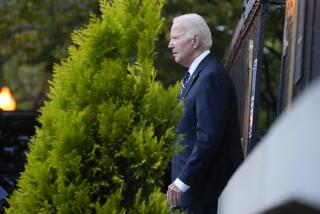Reagan Meets Tower Panel Again, Extends Its Deadline
- Share via
WASHINGTON — President Reagan met Wednesday for a second time with the commission reviewing the workings of the National Security Council in the aftermath of the Iran- contra affair, one day after the panel reviewed excerpts of the private notes he has compiled.
Reagan spent 70 minutes with the board before granting it a second extension to complete its work, giving it a deadline of Feb. 26.
Herbert Hetu, the commission spokesman, said its request for the one-week extension from the previous Feb. 19 deadline “was based on a recent acquisition of new material.” He would not disclose any information about the material.
No Details Given
Neither the White House nor the commission spokesman would disclose details of what was said when Reagan met with the panel’s three members: former Sen. John Tower (R-Tex.), the chairman; former Sen. Edmund S. Muskie (D-Me.), a previous secretary of state, and retired Lt. Gen. Brent Scowcroft, who was President Gerald R. Ford’s national security adviser.
In a statement issued by presidential spokesman Marlin Fitzwater, the White House said only that Reagan and the panel reviewed “the development and execution of the Iran policy and the President’s role.”
“The President answered all of the board’s questions,” Fitzwater said. Reagan was joined by Peter J. Wallison, his White House attorney, and David M. Abshire, a special counselor appointed to handle issues tied to the Iran-contra affair.
After the first meeting between Reagan and the board, on Jan. 26, the President offered to spend more time with the panel “to discuss the decision-making process further,” Fitzwater said.
President’s Notes
The White House subsequently acknowledged that Reagan had been keeping informal notes, recorded in his residence at day’s end. The panel, as well as members of Congress, have expressed interest in seeing them.
As a result of negotiations conducted between the board’s staff and Wallison, the commission was allowed to review the notes. However, under the agreement, the notes will not be published in the board’s report.
The disclosure of the notes’ existence created a problem for the White House. While Reagan has said he would be as forthcoming as possible in providing information about the Iran affair--and has publicly directed his aides to take this course--there was also concern over protecting the privacy of the President’s personal material.
Thus, Fitzwater said, Wallison and the board’s representatives conducted negotiations “to protect the privacy, as much as possible, and still fulfill the wishes and needs of the board.”
‘Board Is Satisfied’
“I think the board is satisfied with the process and feels they’ve had an ample opportunity to review (the notes) and make their independent judgment,” the White House spokesman said.
Hetu, the board spokesman, said the new material that is forcing the delay in completing the panel’s work is unrelated to the notes.
In another development, the White House explained its decision not to try to force Vice Adm. John M. Poindexter and Marine Lt. Col. Oliver L. North to appear before the board. Besides respecting their rights against self-incrimination, the White House cited concern that such forced testimony could make Poindexter and North immune from prosecution.
Poindexter was Reagan’s national security adviser and North was a member of the National Security Council staff when it was disclosed that Iranian money paid for U.S. arms was being diverted to the Nicaraguan rebels. Poindexter resigned and North, said to have been at the center of the operation, was relieved of his post.
Tower Sought Interviews
According to the White House, Tower asked Reagan, as commander in chief, to order the two officers to meet with the board. Both men remain on active military duty.
On Feb. 6, two days after the request was made, Wallison told the board that such an order would be unlawful because it would require them to testify against themselves, in violation of protections guaranteed in the Constitution and the Uniform Code of Military Justice, the White House said.
Fitzwater said Wednesday that, “as a practical matter, if the order was given . . . it would be an illegal order. Therefore, they would not have to comply.” And, if they did testify under such conditions, “total immunity would be granted because, in any subsequent prosecution, it could be argued that their testimony was gained illegally,” he added.
The two officers have both invoked their constitutional rights against self-incrimination and have refused to answer questions posed by congressional committees.
More to Read
Get the L.A. Times Politics newsletter
Deeply reported insights into legislation, politics and policy from Sacramento, Washington and beyond. In your inbox twice per week.
You may occasionally receive promotional content from the Los Angeles Times.










